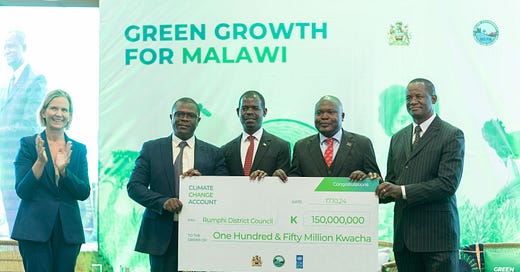Malawi launches Africa Green Business and Financing Initiative roadmap.
A country action roadmap launch spiced with awarding of first climate change grants from Malawi Environment Protection Authority (MEPA).
Dr Yusuf Mkungula, Secretary for Natural Resources and Climate Change (centre) and Dr Robert Kafakoma, MEPA Board Chairperson (far right) together with climate change account grantees displaying a dummy cheque while Fenella Frost, UNDP Malawi Resident Representative (far left) appreciates the gesture.
LILONGWE (Malawi) - In a bid to encourage and facilitate expansion of Malawi's green business and financing activities, the UNDP in collaboration with Ministry of Natural Resources and Climate Change has launched a country action roadmap that could significantly grow the green economy and enhance private sector participation in green business.
Developed under the Africa Green Business and Financing Flagship Initiative (AGBFI), the Malawi Roadmap aims to encourage and facilitate expansion of Malawi's green business and financing activities with strong emphasis on increased private sector participation.
The roadmap identifies areas of green business that are significant for development of green economy, promote low-carbon and create new green jobs. It provides an in-depth analysis of the current market environment, relevant policy frameworks, the financial landscape, and key stakeholders. In addition to identifying sectors and opportunities that have tremendous potential to drive Malawi’s green economy, the roadmap also highlights major barriers that will need to be overcome to unlock the green business and climate financing potential.
The roadmap also shares a list of available sources of funding and recommends high impact initiatives that could significantly grow the green economy and private sector participation in the drive.
The AGBFI is religiously pursued by the UNDP to identify ways and means to support private sector engagement in green business and finance that can drive a sustainable and impactful change in Africa.
Speaking at the launch of the Action Roadmap for Malawi on Thursday October 17, in Lilongwe, Fenella Frost, UNDP Resident Representative talked of the importance of stakeholder engagement with the private sector to see how the roadmap can meaningfully be realized for the benefit of the country.
“This event is not just a celebration of achievements but it is a call to action. It’s a call for each and everyone us to contribute to a future that is greener, more resilient and most importantly, more prosperous. Let us rise to this challenge and together create a greener legacy with a sustainable impact,” Frost said.


Dr. Yusuf Mkungula, Secretary for Natural Resources and Climate Change described the Malawi Country Roadmap for AGBFI an important strategic tool which will guide the country to move towards harmonizing business, finance and environment considerations in daily operations and overall development planning.
“Looking at the recommendations that the roadmap provides, I am confident that we can make an attractive case for private sector involvement in greening the business and finance sector as well as investment into climate change management,” he says.
One of the major challenges to climate action in Malawi is lack of adequate funds and consequently, this prompted government to introduce Carbon Levy to capitalize a Climate Change Account managed by Malawi Environment Protection Authority (MEPA) as one way of ensuring availability of funds dedicated towards building resilience and enhancing adaptive capacity of local communities and ecosystems.
It was gratifying during AGBFI Country Roadmap launch to witness that MEPA appropriated funds from the Climate Change Account to finance four climate change projects that are aligned national policies and strategies on climate change. Being the first cohort of community projects to be funded with domestically generated funds, these projects are expected to how the resources can significantly address impacts of climate change.
Dr. Mkungula said that the allocation of funds from the Climate Change Account to local communities reflects the government's dedication to building communities that are resilient to climate change. He therefore urged the recipients of the grants to utilize the resources effectively.
Corroborating Principal Secretary sentiments, Dr. Robert Kafakoma, the Board Chairperson for MEPA, strongly advised the grantees to be vigilant in the implementation of their projects and ensure prudent use of the financial resources for sustainability of the initiative.
“Do well, then we proceed; you don’t do well, we close the account. That is what means,” MEPA Board Chairperson emphasized.
Kafakoma said a number of organisations submitted project concepts that would help to build climate resilience but after careful considerations in terms of value for money, partnership building as well as collaboration with other stakeholders MEPA settled for projects in Rumphi, Salima, Dedza and Mulanje districts. Each project received a grant of K150 million ( about $86,495)
If properly managed the projects will, among other things, help build capacities of local communities to engage in land, water and fisheries resource conservation activities, enable communities to engage in various livelihood activities and help restore degraded forest landscapes where over 11,000 households are expected to benefit.
With continued support from government, anticipated support from the private sector and development partners, MEPA intends to sustain the initiative by identifying and funding various climate change projects in subsequent years, which will not only be aligned to national prorities on climate change but also in line with the Malawi Vision 2063.
“ Africa is well positioned to be a global leader in climate action and green business. The region’s unique demographics provide a youthful and growing labour force; its vast natural resources are critical to enabling the net zero transition globally. And the continent has huge and large untapped renewable energy generation potential. Proper and timely exploitation of these competitive advantages should be capatalized for Africa to become the engine that drives forward the green industrial revolution across the globe.” Africa Green Business and Financing Report.




